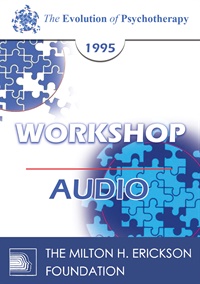EP95 Workshop 13 - Working With A Client Raised in Chemically Dependent Family - Claudia Black, PhD
- Average Rating:
- Not yet rated
- Topic Areas:
- Workshops | Addiction | Homework | Psychotherapy | Treatment Planning | Therapist Development
- Categories:
- Evolution of Psychotherapy | Evolution of Psychotherapy 1995 | Pioneers in Couples and Family Therapy
- Faculty:
- Claudia Black, PhD
- Duration:
- 2 Hours 50 Minutes
- Format:
- Audio Only
- Original Program Date:
- Dec 13, 1995
- License:
- Never Expires.
Description
Description: Those who grow up in chemically dependent families have strong survivorship skills. Unfortunately, for too many, they continue to present to the world a false self often becoming our "closeted" depressed, angry and addicted client. This workshop focuses on 1) treatment orientation and priorities, and 2) core clinical issues. Due to the managed care environment, experiential focus will be on homework assignments.
Educational Objectives:
- To list key foundation recovery issues for a client.
- To recognize treatment orientation to meet many managed care/newer health care expectations.
*Sessions may be edited for content and to preserve confidentiality*
Credits
Handouts
| Timestamped Transcript (2 MB) | 56 Pages | Available after Purchase |
| Ericksonian Learning Snapshot (271.9 KB) | 3 Pages | Available after Purchase |
Faculty

Claudia Black, PhD Related Seminars and Products
Claudia Black, Ph.D., is internationally recognized for her pioneering and cutting-edge work with family systems and addictive disorders. Her work with children impacted by drug and alcohol addiction in the late 1970s fueled the advancement of the codependency and developmental trauma fields. Dr. Black’s passion to help young adults overcome obstacles and strengthen families built the foundation of the Claudia Black Young Adult Center. Not only is Dr. Black the clinical architect of this groundbreaking treatment program, she is also actively involved with the treatment team, patients, and their families.
Claudia is the author of It Will Never Happen To Me, Changing Course, My Dad Loves Me, My Dad Has A Disease, Repeat After Me, It's Never Too Late To Have A Happy Childhood, Relapse Toolkit, A Hole in the Sidewalk, Depression Strategies, Straight Talk, The Stamp Game, Family Strategies, Anger Strategies, Deceived: Facing Sexual Betrayal, Lies and Secrets, The Truth Begins With Youand her newest title, Intimate Treason: Healing the Trauma for Partners Confronting Sex Addiction. She has produced seven audio CDs addressing issues of addiction and recovery. They are A Time for Healing, Putting the Past Behind, Triggers, Emotional Baggage, Trauma in the Addicted Family, Imageries and Letting Go Imageries. She also has over 20 DVDs for professionals to use working with families and clients.


